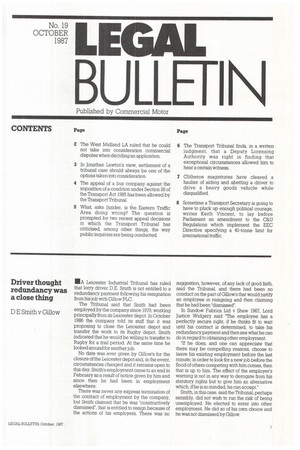Driver thought redundancy was a close thing
Page 101

If you've noticed an error in this article please click here to report it so we can fix it.
D E Smith v Gillow
MA Leicester Industrial Tribunal has ruled that lorry driver D.E. Smith is not entitled to a redundancy payment following his resignation from his job with Gillow PLC.
The Tribunal said that Smith had been employed by the company since 1979, working principally from its Leicester depot. In October 1986 the company told its staff that it was proposing to close the Leicester depot and transfer the work to its Rugby depot. Smith indicated that he would be willing to transfer to Rugby for a trial period. At the same time he looked around for another job.
No date was ever given by Gillow's for the closure of the Leicester depot and, in the event, circumstances changed and it remains open to this day. Smith's employment came to an end in February as a result of notice given by him and since then he had been in employment elsewhere.
There was never any express termination of the contract of employment by the company, but Smith claimed that he was "constructively dismissed", that is entitled to resign because of the actions of his employers. There was no suggestion, however, of any lack of good faith, said the Tribunal, and there had been no conduct on the part of Gillow's that would justify an employee in resigning and then claiming that he had been "dismissed".
In Sundow Fabrics Ltd v Shaw 1967, Lord Justice Widgery said "The employee has a perfectly secure right, if he thinks fit to wait until his contract is determined, to take his redundancy payment and then see what he can do in regard to obtaining other employment.
"If he does, and one can appreciate that there may be compelling reasons, choose to leave his existing employment before the last minute, in order to look for a new job before the flood of others competing with him comes, then that is up to him. The effect of the employer's warning is not in any way to derogate from his statutory rights but to give him an alternative which, if he is so minded, he can accept."
Smith, in this case, said the Tribunal, perhaps sensibly, did not wish to run the risk of being unemployed. He elected to enter into other employment. He did so of his own choice and he was not dismissed by Gillow.
























































































































